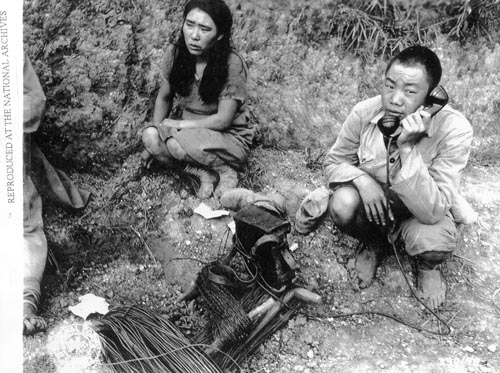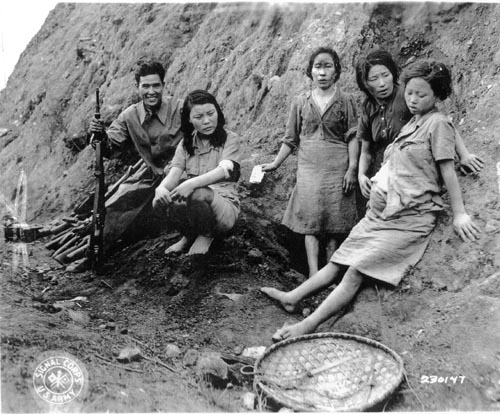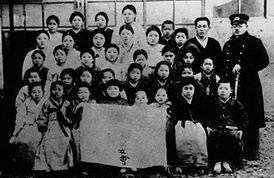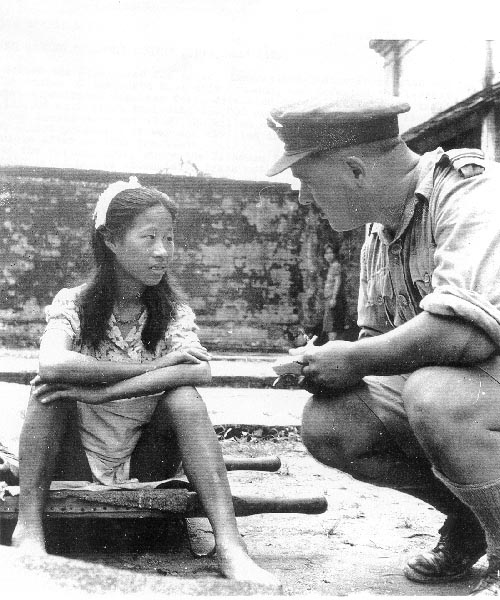
Girls waiting to board the
train for unknown destination.
http://www.twotigers.org/hst.htm
On September 18, 1931, the Japanese army blew up portions of the South Manchuria Railway in Liutiaohu, which is located in a northeastern section of China called Manchuria. Eager to start a war with China, the Japanese claimed Chinese forces had set off the explosions. The Kwantung Army of the Japanese Imperial forces schemed this idea in order to move their troops into Manchuria. This event marked the beginning of the “Manchurian Incident.” The Chinese did all they could to avoid a major confrontation with the Japanese; allowing the Japanese to occupy Manchuria in a relatively short period of time.

Girls waiting to board the
train for unknown destination.
http://www.twotigers.org/hst.htm
In January of the following year, the Japanese had the first violent encounter with the Chinese in the city of Shanghai, which became known as the First Shanghai Incident. The Japanese hoped to focus all attention on the events occurring in Shanghai, therefore taking all eyes off of Japan’s actions to establish the puppet state of Manchukuo in March of 1932. Manchukou was where the Japanese Navy established the first ianjo or comfort stations.
Up until this time, the Chinese government
made many efforts to ban military brothels in Shanghai. In 1929,
the establishment of comfort houses was banned in this city, but the Japanese
found many ways around this law. Japanese prostitutes were employed
as ryoniten shakufu, “restaurant serving women,” which worked as a loophole
for itself, thus creating a form of licensed prostitution. By the
end of 1936, ten military brothels existed, employing 102 Japanese women
and 29 Korean women as prostitutes. Seven of these comfort houses
were considered navy brothels, while the other three were “Japanese restaurants.”
The Japanese justified the need for military brothels by claiming it would
prevent the spread of venereal diseases (VD) and also prevent rape committed
by their own soldiers. In the diary of Lieutenant-General Okabe Naozaburo,
a senior staff official in Shanghai, he wrote:
"Recently, I have heard a lot of scandalous stories, including that some [of] our soldiers wander around seeking women. Such a phenomenon is hard to prevent as fighting becomes less frequent. Therefore, the establishment of appropriate facilities must be accepted as a good cause and should be promoted. In consideration of our soldiers’ sexual problems, we have decided to introduce various measures. Lieutenant-Colonel Nagami Toshinori is now responsible for this task."
From this record, along with many others,
it is clear comfort houses were established by top ranking military officials
in the Japanese Imperial Army in Shanghai. Senior staff officers
enforced the actual plan.

"Woman with Chinese Soldier"
http://www.cmht.com/casewatch/cases/comf-headbandaged.jpg
Comfort women could be a deceiving term for the forced prostitution that occurred during World War II. These “women” averaged between 14 and 19 years of age, a betrayal of a report in 1939 that stated women had to be at least 21 years old in order to participate in the “shameful calling” overseas. All were unmarried and countless were virgins at the time of their capture. Most of these women were deceived into becoming comfort women. They were commonly told of educationally opportunities abroad, only to arrive at comfort houses. Women were also captured, sold, and taken forcefully from their home. These women had no clue what was in store for them. Upon arriving at the comfort houses, they soon learned that their life would never be the same.
A day in the life of a comfort woman was a never-ending nightmare that few could even imagine. Their schedule was regimented, serving an average of twenty to forty men daily. Hours varied at each comfort station, but usually took a similar shape to that of the 13th Independent Infantry Brigade Chuzan Garrison stationed in Zhongshan, Guangdong Province. Enlisted men had access to the women from 9:30 a.m. to 3:30 p.m.; noncommissioned officers could use the brothels from 4:00 p.m. to 8:00 p.m.; and officers had access from 8:30 p.m. until the morning. Only officers were permitted to use the comfort houses at night and they were allowed to stay overnight. The days were long, but the night grew longer with repeated offenses by the same officer throughout the night.
"Twelve soldiers raped me in quick succession, after which I was given half an hour rest. Then twelve more soldiers followed. They all lined up outside the room waiting for their turn. I bled so much and was in such pain, I could not even stand up. The next morning, I was too weak to get up…I could not eat. I felt much pain, and my vagina was swollen. I cried and cried, calling my mother. I could not resist the soldiers because they might kill me. So what else could I do? Every day, from two in the afternoon to ten in the evening, the soldiers lined up outside my room and the rooms of six other women there. I did not even have time to wash after each assault. At the end of the day, I just closed my eyes and cried. My torn dress would be brittle from the crust that formed from the soldiers’ dried semen. I washed myself with hot water and a piece of cloth so I would be clean. I pressed the cloth to my vagina like a compress to relieve that pain and the swelling."
Comfort women existed at all corners
of the globe. Each and every girl had a similar story of the cruel
and inhumane treatment they had to endure at the hands of the Japanese
soldiers.

"Pregnant woman guarded by soldier"
http://www.cmht.com/casewatch/cases/comf-headbandaged.jpg
The rules were simple, yet they varied from city to city. In Shanghai, the regulations were simple:

Comfort Station at Shanghai
on the top of the door is a room
number and the name of the
"Comfort Women".
January, 1938
http://www.jlhs.nhusd.k12.ca.us/Teacher_Services/Shared/DForrest/WWII_Memorial/THE_COMFORT_WOMEN/page_2.html
Venereal Diseases affected both the prostitutes and soldiers. The Japanese believed that VD threatened to emasculate the strength of their men and consequently, their fighting ability. They also feared the spread of disease could also lead to massive health problems in Japan once prevent their soldiers from contracting VD. In Pingquan, there were three or four brothels in each licensed quarters, employing about twenty prostitutes total, but it was soon determined that many of these women were infected with VD. The soldiers were quickly banned from going to these brothels. This intensified the need for military-established comfort houses where diseases could be closely monitored.
Brigade medical officers conducted medical examinations of comfort women weekly. In addition, two condoms were passed out to each soldier, 15,528 condoms total. The soldiers were instructed exactly how to use the condoms and to apply prophylactic chemicals directly after returning from the houses. Despite these efforts, reports from the medical officers of the 15th Division in north China in 1942 and 1943, stated that at least 15 to 20 percent of the comfort women were suffering from VD each month. Although, evidence from comfort women show that this percentage was most likely much higher than the Japanese reported.

"Girls waiting in Hospital Hallway"
http://www.twotigers.org/hst/6.htm
The problem occurred because many soldiers refused to use condoms and did not bother to apply the prophylactic disinfectants. Numerous former comfort women have testified that they had great difficulty getting the men to use condoms, even though the men were told to assume every woman was infected with VD. “The condoms in those days were thick and crude, and some men refused to wear them,” an anonymous former comfort woman testified. When men were willing to use a condom, there was rarely one available, forcing women to wash and reuse old condoms.

"Comfort Women Resting"
http://www.twotigers.org/hst/2.htm
Another reason for the high numbers of people infected with VD was the disciplinary tactics that infected soldiers had to endure. Those found to be infected were demoted two ranks, forcing soldiers to keep their disease a secret. They would secretly go to civilian pharmacies to purchase the medication they needed. The medicine required was expensive, forcing the soldier to steal in order to get the money. Therefore, the measures implemented to stop the spread of disease, did not stop VD and also led to an increase in crimes committed by Japanese soldiers.

Korean girls kidnapped and
locked up in the police station.
http://www.twotigers.org/hst.htm
Comfort women were also subjected to many different diseases. They were constantly injected with salvarsan or Terramycin, used as both a prophylactic and a treatment. “I saw so many deaths, so much illness. Girls arrived; they got sick and pregnant. The Japanese injected us with so many drugs like ‘#606’ that we would have miscarriages. Sometimes our bodies would swell up like balloons but the Japanese soldiers did not care.” The long-term damage to their reproductive systems was untreatable and the mental trauma the comfort women endured was eternal. Although the comfort women were sent to China as “gifts to the Imperial Army,” they were called “public toilets” and were placed on military supply lists under the title of “ammunition.” Women were treated as military instruments rather than human beings; they were seen as a necessity and the Japanese did not care about the fate of these unfortunate women.
The purpose of instituting comfort houses
was not limited to the prevention of rape and sexually transmitted diseases.
Official brothels were established with the goal of providing “comfort”
to the soldiers-hence the name, comfort women-and also to provide protection
against spies. The war Japan provoked was an aggressive and unjustifiable
war.
In addition, the war was an out of control war in which Japan had no hope
of winning. In order for Japan to fight this type of battle, the
Japanese Army kept their troops in the field for long periods at a time.
Comfort houses became necessary to keep the soldiers busy between battles.
The North China Area Army instructed commanders
that in order to avoid the “deterioration of soldiers’” thoughts in a bleak
environment, it is necessary to improve hygiene facilities [comfort houses]
as much as possible and facilities for the comfort of the troops should
be improved as much as possible.” The goal was to “pacify the troops
brutal temperament” through offers of sex. Unlike the
United States and other Allied troops, the Japanese soldiers were not granted
designated leave periods or limited tours of duty, thus confining their
men in selected areas. There are reports of a proposed plan in 1939
that called for the establishment of a different type of comfort house.
These comfort houses would be equipped with leisure facilities for music,
libraries, movies, and sports. Unfortunately, this plan was never
instigated.
Superstitions are widespread in the armed forces. The Japanese, in particular, are known for their strange rituals and practices in a time of war. The Japanese believed that sex before going to battle worked as a defense against injury. Good luck charms were made from the pubic hair of comfort women or something that belonged to them. Soldiers who did not have sex before combat were seen as accident-prone. Another common rationale stated that men without previous sexual experience should have sex at least once before death. A man who did not take part in this activity was seen as an outcast. In one particular incident, an officer forced a soldier to have sex with a comfort woman, and watched from holes in the wall as the women chased him around the room.

"Two women interrogated by soldiers"
http://www.cmht.com/casewatch/cases/comf-headbandaged.jpg
The danger of spies and the fear of leaking secrets to the Chinese, made local brothels very unsafe for military personnel. Official, military-established comfort houses were able to control the people entering the facility. Military police or inspection officers went to military brothels frequently to examine the management practices as well as the relationship between the soldiers and comfort women. To prevent the occurrence of spies in the comfort houses, the army wanted all prostitutes to be Japanese subjects (Japanese, Koreans, or Taiwanese). Due to limited numbers of women and the expenses related to shipping women to China, the Japanese army was force to recruit local women for use in the brothels. Chinese women were watched closely, in fear that they would be bribed by spies into obtaining top-secret information from the Japanese.
Evidence surrounding the abuse of comfort women is abundant and it is clear the Japanese government had full knowledge of the events surrounding the comfort houses, yet few people were ever implemented in this crime. There is no doubt that the Japanese committed crimes against humanity as defined in the Charter of the Nuremberg International Military Tribunal. At the International Military tribunal for the Far East, not even one person was tried for committing crimes against humanity. The reason was not because it was believed that these crimes were not committed, but rather, the American and European prosecutors and judges did not want to confront this large-scale issue. The moral aspect of these crimes and the publicity the trial would attract, frightened these countries into not pressing charges. Who knew what the reaction would be in the United States and Europe, if the proper people were not charged with these inhumane crimes. The public would expect all those guilty punished, but with a crime to widespread, it is impossible.

"Chinese Girl Interrogated by British"
http://www.cmht.com/casewatch/cases/comf-headbandaged.jpg
Evidence to support claims against the Japanese was also very hard to come by. At the end of the war, the Japanese government destroyed many, if not all, of the documents related to the comfort houses. Comfort women found it very difficult to speak of the horrors they encountered during their time as sex slaves. Finding the necessary amount of women to speak openly about their experiences at the Military Tribunal would have been extremely difficult. These women were humiliated and felt like a disgrace to their country, many could not even tell their families of the repeated rapes they encountered; public testimony would have only brought further embarrassment.
Back
Home
Forward
Bibliography
Revised 11/20/02 by Kellie
Johnson